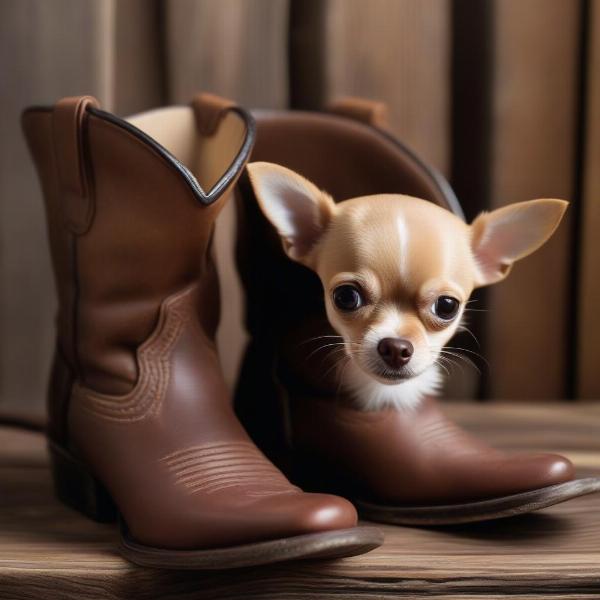The term “boot dog” paints a charming picture of a small dog peeking out of a cowboy boot. While there’s no officially recognized breed called a “boot dog,” the term generally refers to small dog breeds that could conceivably fit inside a boot. This article explores the “boot dog” phenomenon, discussing popular small breeds often associated with the term, the pros and cons of owning small dogs, and crucial care tips. We’ll also debunk some common myths and help you decide if a “boot dog” is the right fit for your lifestyle.
Popular “Boot Dog” Breeds
Several small dog breeds are commonly associated with the “boot dog” image. These breeds are popular for their portability and often affectionate nature. Here are some examples:
- Chihuahua: Known for their tiny size and big personality, Chihuahuas are a classic “boot dog” contender.
- Yorkshire Terrier (Yorkie): These long-haired beauties are another popular choice, known for their elegant appearance and playful attitude.
- Pomeranian: These fluffy companions are surprisingly small and make adorable “boot dogs” with their fox-like faces.
- Toy Poodle: Intelligent and hypoallergenic, Toy Poodles are a great option for allergy sufferers seeking a small companion.
- Maltese: These pure white, long-haired dogs are known for their gentle and loving nature.
 Chihuahua in a Boot
Chihuahua in a Boot
Pros and Cons of Owning a “Boot Dog”
Owning a small dog comes with its own set of advantages and disadvantages.
Pros:
- Portability: Small dogs are easy to travel with and can often accompany you on adventures.
- Lower Food Costs: Smaller dogs eat less food, which can save you money in the long run.
- Apartment Living: Many small breeds are well-suited for apartment living due to their lower exercise needs.
Cons:
- Fragility: Small dogs can be more prone to injuries due to their delicate bones.
- Potential for Barking: Some small breeds are known for their tendency to bark excessively.
- Grooming Needs: Certain small breeds, especially those with long hair, may require regular professional grooming.
Caring for Your “Boot Dog”
Regardless of breed, caring for a “boot dog” requires attention to specific needs.
Nutrition and Feeding
Small breeds have different nutritional requirements than larger dogs. Choose high-quality food formulated for small breeds and avoid overfeeding to prevent obesity.
Training and Socialization
Early socialization and training are crucial for small dogs to prevent behavioral issues like excessive barking or aggression.
Exercise
While small dogs require less exercise than larger breeds, they still need daily physical and mental stimulation. Short walks, playtime, and puzzle toys can keep them happy and healthy.
Debunking “Boot Dog” Myths
One common misconception is that all small dogs are delicate and require pampering. While some small breeds can be prone to certain health issues, many are surprisingly robust and resilient. It’s essential to research specific breeds to understand their individual needs and temperaments.
Is a “Boot Dog” Right for You?
A “boot dog” can be a wonderful companion for the right owner. Consider your lifestyle, living situation, and ability to meet the specific needs of a small breed before making a decision.
Conclusion
The “boot dog” trend celebrates the charm and portability of small dog breeds. While there’s no official “boot dog” breed, the term encompasses a variety of small companions that bring joy and companionship to their owners. Remember to research specific breeds and prioritize responsible pet ownership to ensure a happy and healthy life for your “boot dog.”
FAQ
- Are “boot dogs” good for first-time owners? Some small breeds are easier to care for than others. Research is crucial.
- Do “boot dogs” need a lot of exercise? While they need less than large breeds, daily exercise and mental stimulation are important.
- Are “boot dogs” expensive to care for? Costs can vary depending on the breed, grooming needs, and potential health issues.
- Can “boot dogs” be trained? Yes, early training and socialization are key for a well-behaved small dog.
- Are “boot dogs” good with children? Some small breeds are better with children than others. Research individual breeds.
- Do “boot dogs” bark a lot? Some small breeds are prone to barking, while others are relatively quiet.
- What is the lifespan of a “boot dog”? Lifespans vary by breed, but small dogs generally live longer than larger breeds.
ILM Dog is your global resource for expert dog care advice. We offer comprehensive guides on breed selection, health, training, nutrition, and more. Whether you’re a seasoned dog owner or just starting out, ILM Dog is dedicated to providing the information you need to ensure your canine companion thrives. For any questions, contact us at [email protected] or +44 20-3965-8624. Visit ILM Dog for all your dog care needs.